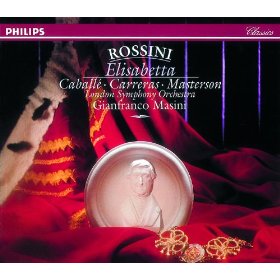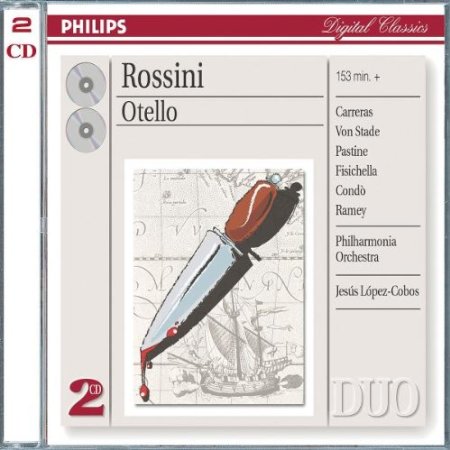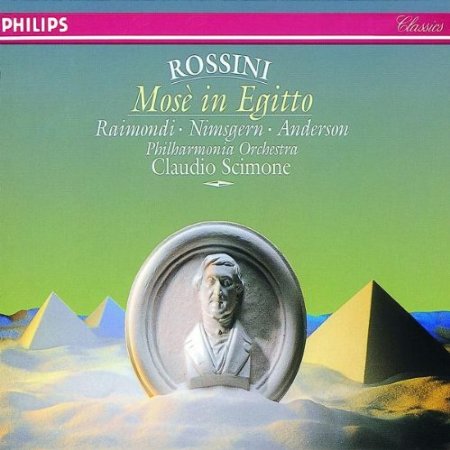ROSSINI Mosè in Egitto; Otello; Elisabetta, Regina d'Inghilterra
View record and artist detailsRecord and Artist Details
Composer or Director: Gioachino Rossini
Genre:
Opera
Label: Classics
Magazine Review Date: 12/1992
Media Format: CD or Download
Media Runtime: 141
Mastering:
ADD
Catalogue Number: 432 453-2PM2

Tracks:
| Composition | Artist Credit |
|---|---|
| Elisabetta, Regina d'Inghilterra |
Gioachino Rossini, Composer
Ambrosian Singers Gian-Franco Masini, Conductor Gioachino Rossini, Composer José Carreras, Leicester, Tenor London Symphony Orchestra Montserrat Caballé, Elisabetta, Soprano Neil Jenkins, Guglielmo, Tenor Rosanne Creffield, Enrico Ugo Benelli, Norfolk, Tenor Valerie Masterson, Matilde, Soprano |
Composer or Director: Gioachino Rossini
Genre:
Opera
Label: Duo
Magazine Review Date: 12/1992
Media Format: CD or Download
Media Runtime: 153
Mastering:
Stereo
ADD
Catalogue Number: 475 448-2PM2

Tracks:
| Composition | Artist Credit |
|---|---|
| Otello (or Il moro di Venezia) |
Gioachino Rossini, Composer
Alfonso Leoz, Doge; Gondoliere Ambrosian Opera Chorus Frederica von Stade, Desdemona, Mezzo soprano Gianfranco Pastine, Iago Gioachino Rossini, Composer Jesús López-Cobos, Conductor José Carreras, Otello, Tenor Keith Lewis, Lucio, Tenor Nucci Condò, Emilia, Soprano Philharmonia Orchestra Salvatore Fisichella, Rodrigo Samuel Ramey, Elmiro, Baritone |
Composer or Director: Gioachino Rossini
Genre:
Opera
Label: Insignia
Magazine Review Date: 12/1992
Media Format: CD or Download
Media Runtime: 146
Mastering:
ADD
Catalogue Number: 420 109-2PM2

Tracks:
| Composition | Artist Credit |
|---|---|
| Mosè in Egitto |
Gioachino Rossini, Composer
Ambrosian Opera Chorus Claudio Scimone, Conductor Ernesto Palacio, Osiride, Tenor Gioachino Rossini, Composer June Anderson, Elcia, Soprano Keith Lewis, Mambre, Tenor Philharmonia Orchestra Ruggero Raimondi, Mosè, Bass-baritone Salvatore Fisichella, Aronne Sandra Browne, Amenosi Siegmund Nimsgern, Faraone, Baritone Zehava Gal, Amaltea |
Author: Richard Osborne
Rossini made his debut in Naples with
The Elisabetta is Monserrat Caballe, no less. There are some who might want less diplomatic restraint from the jilted Queen than Caballe offers us. She talks of fierce distress but is rarely fierce; her great injunction to Matilde ''Renounce!'' is eloquent rather than imperative. Stendhal described Isabella Colbran, the creator of the role, as a modern commentator might have described Callas. ''When Signorina Colbran talked with Matilde it was impossible to escape the irrefutable conclusion that this woman had reigned for twenty years as a queen whose authority was absolute and supreme. It was the ingrained acceptance of manner and mannerism bred by despotic power which characterized this great artist.'' Caballe communicates little of this vocally. Yet she is regal, and very feminine. Rightly so, for Elisabetta's music is exquisitely rather than fiercely wrought. Elisabetta's final scene is a miracle of soft sweet inwardness; and the glorious duet with Matilde is like an ethereal preview of ''Mira, o Norma''. The libretto, in fact, dictates a sweet reasonable queen.
The Otello (Naples 1816) also has a strong cast, headed by Carreras's searingly noble Moor. The Desdemona is Frederica von Stade: chaste and as luminous as a sculpture in Carrara marble. The set also displays casting in depth. In Rossini's day Naples was awash with great tenors, a situation that nowadays creates prodigious difficulties. Yet both the Iago, Gianfranco Pastine, and the Rodrigo, Salvatore Fisichella, emerge with honour, barely bloodied and never for a moment bowed by Rossini's terrible arsenal of vocal effects. ''They have been crucifying Otello into an opera,'' wrote Byron in 1818. Well, yes and no. By all means treat Acts 1 and 2 as flashy rodomontade, but Act 3 is glorious, inspired enough and sufficiently close to Shakespeare to have been a near fatal deterrant to what Verdi called his own ''chocolate project''. I thrilled to it afresh—off-stage Gondolier and all—in these brilliant new CD transfers.
If Elisabetta and Otello offer inspired scenes but the odd
Transfers to CD often find out lapses and glitches in the original productions. But these are immaculate—technically proficient, scholarly, musically memorable. There are no booklet credits, but the productions owe their existence to unstinting work in the Rossini cause of Erik Smith, and to Philip Gossett whose influence has never been far away. There is nothing old-fashioned or fustian about these sets. All three are necessary library acquisitions for lovers of memorable opera memorably performed.'
Discover the world's largest classical music catalogue with Presto Music.

Gramophone Digital Club
- Digital Edition
- Digital Archive
- Reviews Database
- Full website access
From £8.75 / month
Subscribe
Gramophone Full Club
- Print Edition
- Digital Edition
- Digital Archive
- Reviews Database
- Full website access
From £11.00 / month
Subscribe
If you are a library, university or other organisation that would be interested in an institutional subscription to Gramophone please click here for further information.




